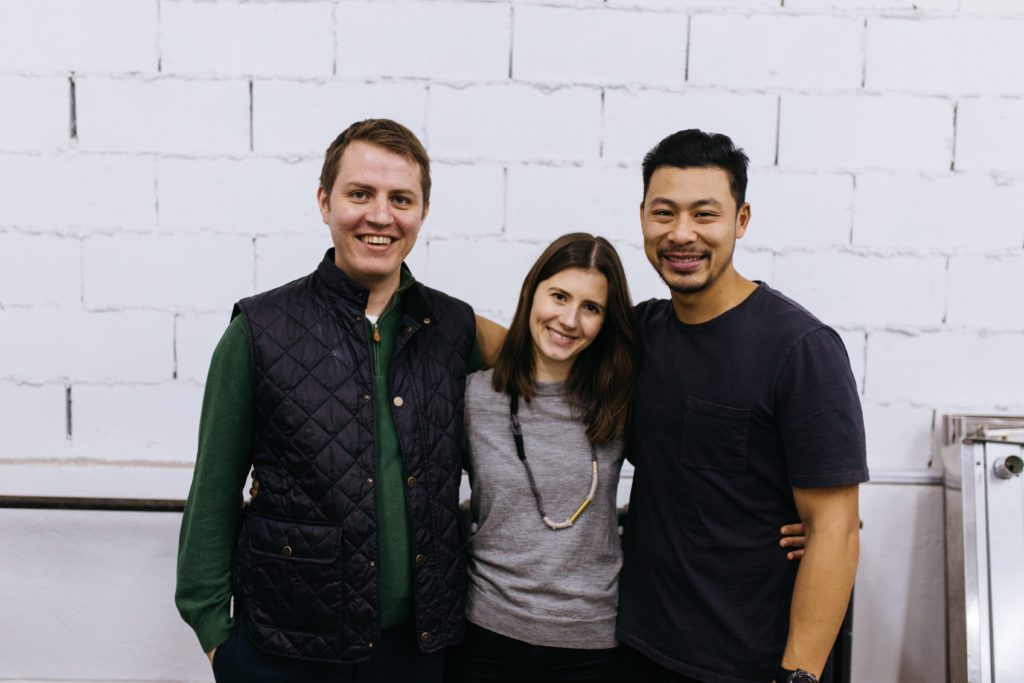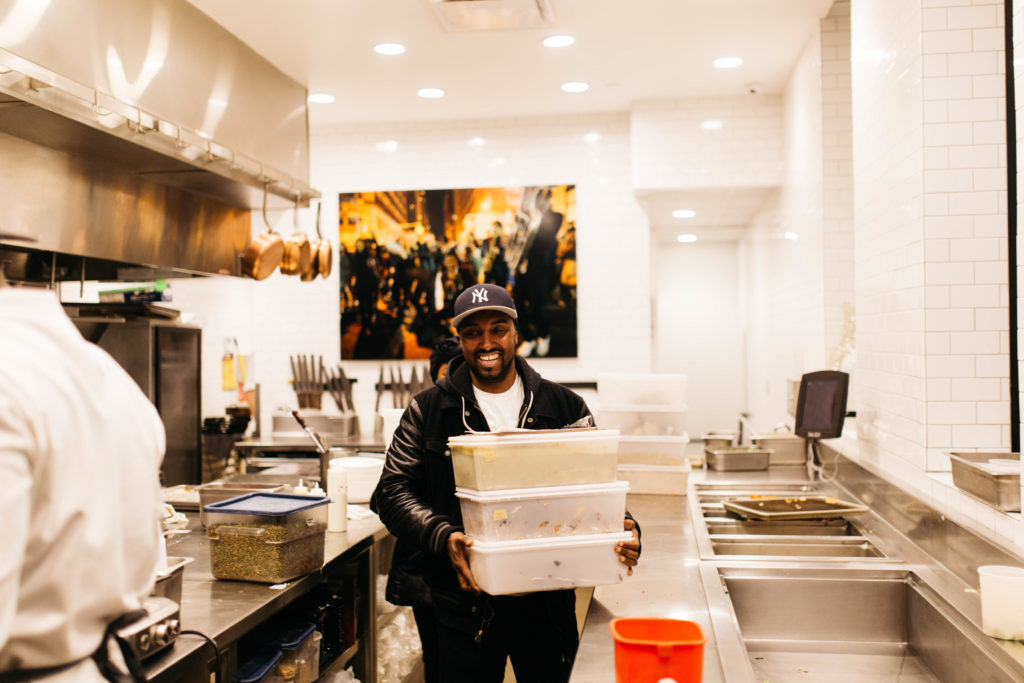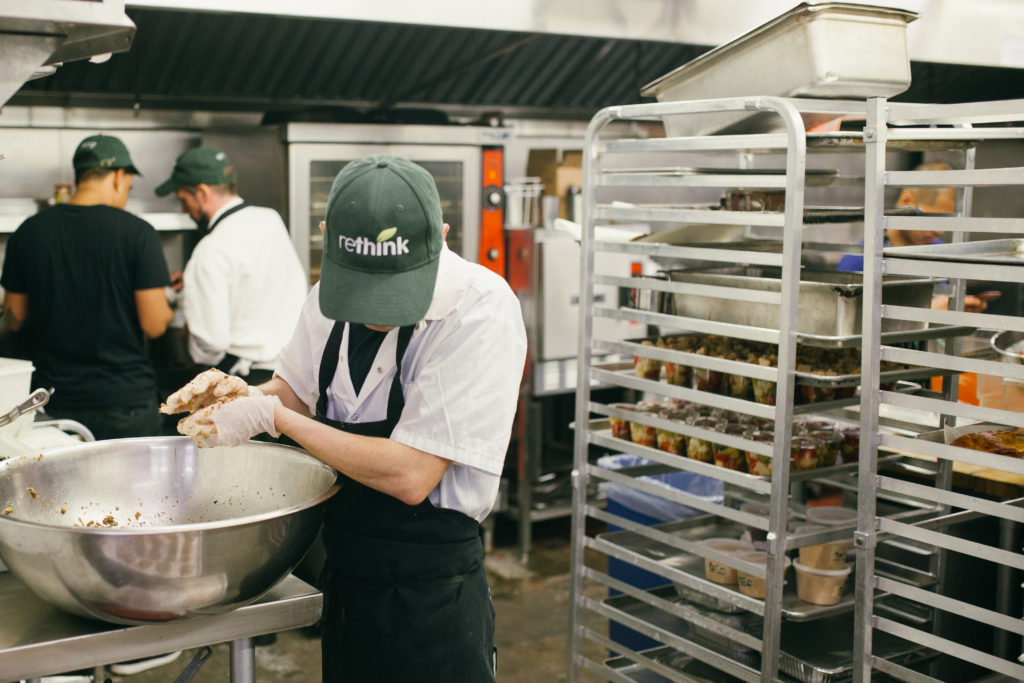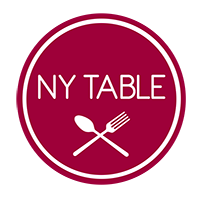
A ReThink prepared meal: green salad with asian pears, cherry tomatoes, croutons, and parmesan cheese with roasted butternut squash soup and candied pepitas. Photo: Samantha Keeler.
Imagine a Panzanella salad with focaccia, roasted portabello mushroom, swiss chard, broccoli rabe, and carrot relish. How about roasted butternut squash with Napa cabbage, mushroom puree, green peas, and basil, or chicken curry with cauliflower, rutabaga, pistachio butter, celery root puree, parsnips, eggplant, and tomatoes?
These entrees and more have been carefully prepared using ingredients donated from some of the city’s finest restaurants, including Gramercy Tavern, The Grill, and Eleven Madison Park, and distributed to area soup kitchens, shelters, and rescue missions to help feed New York’s hungriest residents, by ReThink Food NYC.
ReThink, a new nonprofit founded in 2017, is dedicated to repurposing unused and excess food into delicious and nutritious meals for those most in need. Founder and executive director Matt Jozwiak, a restaurant veteran who worked in Eleven Madison Park’s kitchen, among others, had noticed how much food was going to waste at the end of each night, and was keenly aware of the city’s hunger issue. He saw an opportunity: Why not take restaurant excess, prepare it as ready-to-eat meals, and deliver them to agencies feeding the city’s hungry? ReThink has been actively executing this plan since April 2018, with the help of fourteen current donors, including five restaurants, to nine human service organizations.
But there’s still a perception among independent restaurants in New York that it’s impossible, or at least difficult to do something with their leftover food. In the most recent 2016 study by the Food Waste Reduction Alliance, restaurants in the United States dispose of 93.7% of unused food, while donating a mere 2.0%.
Department of Health restrictions and the threat of liability are seen as a major risk. But the fact is, Good Samaritan Laws at both the state and city level protect donors. There has never been a lawsuit brought against a contributing restaurant. Food aid organizations’ stringent operations and guidelines are also interpreted as an obstacle, including the size of a donation, insufficient on-site refrigeration and storage, and transportation.

At Harold’s Restaurant in the Arlo SoHo Hotel, executive sous chef Bryce Sorem explains “The truth is, no chef likes wasting food—and every kitchen is doing stuff to reduce its waste. But I don’t know if there’s a solution.”
In Bushwick, Manny Salazar, chef at Lua bar and restaurant, wishes he was able to donate, but doesn’t see how. “As a cook there’s always a little shame involved with excess food. You ask yourself, ‘how can I yield more usable product? What can I do with the scraps?’ Sometimes it’s easier to hide the shame in the trash. Sometimes it’s easier to shrug it off and eat it for family meal. Small restaurants need to run a tight ship to survive. My perception is that if a small business is throwing away resources they could have otherwise donated, they may not stay in business for much longer.”
But thanks to ReThink, that perception is starting to change.
“The core of the problem is in how chefs think about their leftover food,” Joziwak opines. “’Waste’ is a banana peel. ‘Excess’ is squash trim. They’re two different things. It’s not all garbage. We’ve become too general, using phrases like ‘the homeless,’ ‘the hungry.’ What does that mean? The truth is one in seven people is food insecure,” says Jozwiak, quoting a national Feeding America statistic he likes to use.
ReThink has partnered with and created unique donation programs for several NYC restaurants, providing the infrastructure to retain, store, and deliver useable food. Pick-up times are also tailored to each restaurant’s needs. ReThink’s two trucks make their rounds five days a week, collecting five pounds here, thirty pounds there. It may not sound like much, but it’s adding up to about six-hundred prepared meals per day.

Chef Dan Haar, who runs Major Food Group’s three restaurants at 375 Park Avenue, including The Grill, agrees with Salazar. “You want to keep your waste down—you should know exactly what you’re disposing. It’s our job to use as much as we can.” Haar estimates between the three restaurants, he’s provided ReThink with five to twenty pounds of excess per day. “The irony is we’re trying to give ReThink as little to do, and they’re trying to get as much as they can from us. Still, they’ve been the easiest and most effective organization to work with in terms of alleviating the strain on a restaurant to participate in donating.”
City Harvest, the largest food rescue organization in the city, feeding 1.2 million New Yorkers this year alone, requires a minimum 100 pounds a day for a pickup, a seeming hurdle for smaller operations. But according to Ruth Lindner, City Harvest’s food sourcing and donor relations manager, they’re happy to make weekly, as opposed to daily, 100-pound pickups. She worries that businesses may not even be aware “there is a need very close to home,” and is willing to help connect restaurants and food agencies.
Eric Ripert, chef and co-owner of Le Bernardin, has partnered with City Harvest since 1993, and serves as vice chairman of its board of directors. “At Le Bernardin we have many ways to meet the minimum, donating both raw and prepared foods, but it is important to keep in mind this minimum was established years ago as a way of being efficient,” he said. “It isn’t efficient for trucks to pick up five pounds here and there.”

Sarah Munger, ReThink’s director of operations, says they’ve hired a sustainability consultant, expect to obtain an electric truck, and map their truck’s routes to improve efficiency and achieve their zero-emissions goal. But Haar wonders, “As they grow, can they keep it up?”
Michael Anthony, Gramercy Tavern’s executive chef, is optimistic about ReThink’s future. “Matt cares so much; that’s how he’s been able to make this work. He’s taken on the part of the job that no one else wants to do. ReThink will have to go through many metamorphoses, but when there’s a will there’s a way.”
Tags: City Harvest, donating food, Eleven Madison Park, Eric Ripert, Gramercy Tavern, Le Bernardin, Major Food Group, NEW YORK CITY, ReThink Food NYC, The Grill
Your Comments